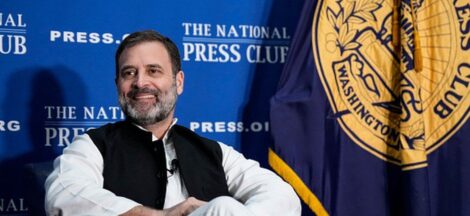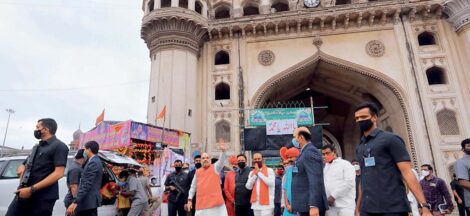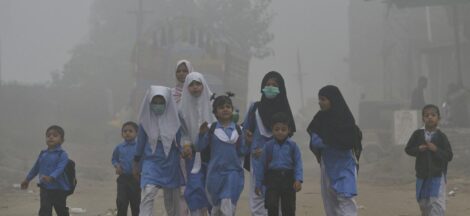By G. Srinivasan
India and China do not enjoy natural bonhomie due to historic and legacy issues that range from border disputes of bygone decades to the latest crop of problems originating from the dumping of the Middle Kingdom’s cheap products into the Indian markets. Yet as the adage goes, enemy’s enemy is a friend, India and China have warmed up to espousing the common cause of hitting the rich world where it hurts their strong domestic interests. As the trade majors in the WTO such as the United States and the European Union have questioned India’s Minimum Support Price (MSP) for guaranteed returns to farmers and the public stockholdings of food grains for targeted distribution to the weak and the vulnerable, India has garnered the support of Beijing in a measured and nuanced proposal for the rich world to do away with their bloated farm subsidies where the WTO has let them higher amounts beyond de minimus (ceiling) norms.
In a joint proposal just submitted in the WTO, the two Asian giants called for the reduction process of farm subsidies of rich nations might start as early as 2019 to dissuade any asymmetry in the WTO pact on agriculture and abolish the attendant distortions in the global grain trade. The joint proposal plainly put it that “any meaningful attempts at reforms in agriculture subsidies must address the asymmetry between the developed members on the one hand and the developing members on the other hand in their respective entitlements to aggregate measurements of support (AMS) beyond de minimis and the flexibility to provide high product specific support”. They made it plain as a pikestaff that negotiations on further discipline on domestic support for agriculture should begin only after reductions of trade-distorting subsidies by developed countries.
It needs to be noted that the fresh joint proposal was a follow-up to the earlier one submitted last year in the run-up to the Buenos Aires WTO ministerial, where both India and China contended that the rich world has been consistently disbursing trade-distorting subsidies (AMS) to their farmers at levels much higher than the ceiling applied on developing nations . Amplifying this contention, they said the WTO rules provided flexibility to a handful of countries, permitting them to hike harmful subsidies beyond de minimis levels, which led to subsidies for many items provided by the rich nations going over 50 to 100 per cent of the production value, even while the developing nations were told to contain it within 10 per cent ceiling of their aggregate output or face penalties.
The new proposal enjoins a ceiling and reduction in AMS beyond de minimis as product-specific support would be the most important and incremental first move in the reform process for establishing a fair and market-oriented agricultural trading system. In a transparent move to ensure accountability, the proposal sought each WTO member with AMS entitlements beyond de minimis might annually notify the Committee on Agriculture about the product-specific AMS beyond de minimis and the value of production of the concerned agricultural product in sufficient details in order to monitor compliance with the obligations so entailed.
This joint proposal of the Asian majors has not come a day too soon even as the rich nations in general and the United States in particular have no qualms in undermining the multilateral system governing global trade, manifest in the establishment of the erstwhile General Agreement on Tariffs and Trade (GATT) in the post-war order and its subsequent new avatar the WTO. In a direct assault on the rich world’s costly farm subsidy practice, the inter-governmental think tank of 34 rich industrial countries, the Organization for Economic Cooperation and Development (OECD), minced no words when it excoriated their agricultural support policies as being “poorly aligned with defined objectives, while measures that distort production and trade continue increasing in some countries”.
In its well-researched tome titled Agricultural Policy Monitoring and Evaluation, 2018, released at its Paris headquarters in the last week of June, OECD bemoaned that in 2015-17, the agricultural policies of the 51 countries that include members of OECD, the European Union and 10 key emerging economies that include China and Russia but excludes India, provided a total of 620 billion dollars or euro 556 billion a year on average to their farm sector! Around 78 per cent of this, i.e., 484 billion dollars or euro 434 billion a year was made over to individual producers (farmers), representing around 15 per cent of gross farm receipts. In effect, it bluntly put it that in 2015-17, almost two-thirds of producer support across the 51 countries covered continued to be provided via measures that distort farm business decisions particularly strongly.
Pitching for a raft of reasonable and robust policy measures, it said a first step is to remove extant policy dis-incentives to increasing productivity, sustainability and resilience. The remaining production and trade-distorting support, directly linked to output and input use, should be reduced over time and eventually eliminated, it said adding that this would allow domestic and global markets to function better, deter over-use of inputs that could damage the environment and make limited public funds available for more efficient and effective alternative investments.
Rightly does the OECD report set store by public investment in research, including efforts to ensure that the outputs of this research reach farmers can go a long way to ensure that the sector has the capacity to respond to evolving needs and challenges. Collaboration on knowledge generation and transfer with public and private sectors—nationally, regionally and globally—should be encouraged. New information and communication technologies (ICT) also appear to offer untapped potentials to improve policy performance as also on farm productivity, sustainability and resilience.
A worthy takeaway from the foregoing is that there is not much for India to gain by associating itself with China in cocking a snook at rich world’s costly farm practices when China is also exculpated for its huge payout of producers’ subsidy of trade-distorting nature. India is still an outlier in the sense that its aggregate measurement of support to its farm sector is not that big nor its proposal to double MSP to its farmers a drain on the public finances, provided the authorities so design the incentives as to help augment farm output while ensuring environmental regeneration and sustainability eventually. (IPA Service)
The post India Has Little To Gain By Dancing With Dragon appeared first on Newspack by India Press Agency.


